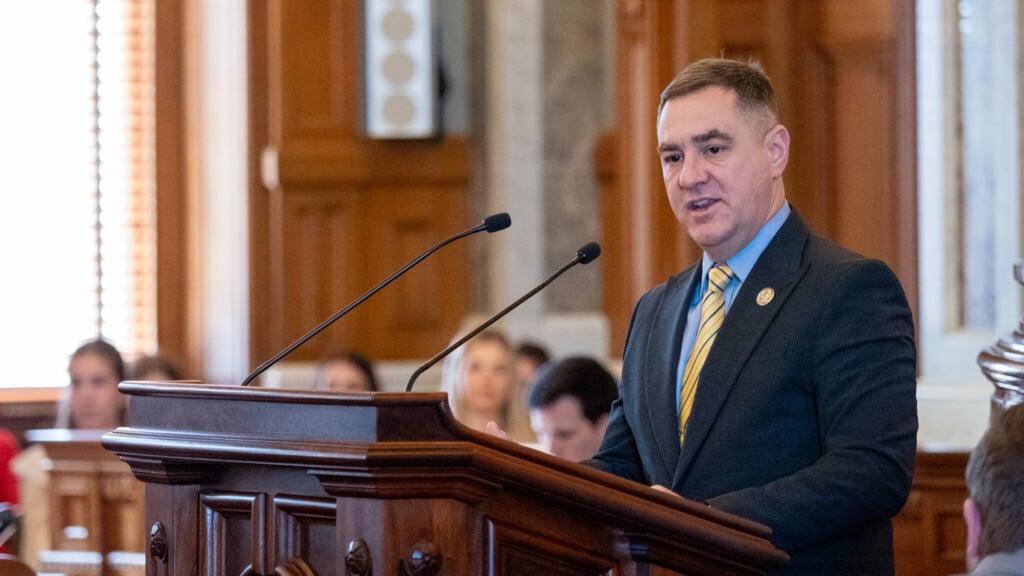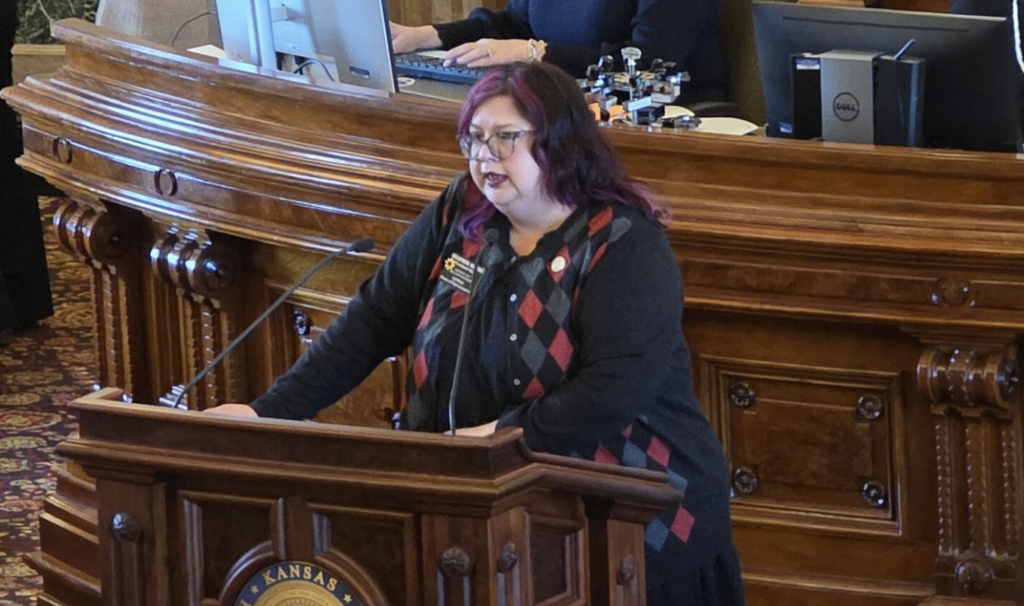Missouri anti-abortion protestors have changed their language over the years, but the proud extremism remains the same
In the summer of 1978, an anti-abortion activist named Sam lied his way into a counseling session at Missouri’s first abortion clinic, Reproductive Health Services in St. Louis.
The counseling session was meant for those accompanying patients to their appointments, typically their moms or boyfriends. They would learn about the procedure, talk through their feelings about what had brought them there, and prepare to support the patients after the procedure.
Sam got himself and his tape recorder in by procuring urine from a pregnant woman and having another activist pass it off as her own in order to get an appointment.
During the session, Sam played the part of an especially concerned boyfriend, asking question after question. He was only discovered after the doctor determined his companion was not pregnant.
This story, recounted in Cynthia Gorney’s 1998 book, Articles of Faith, gets stranger.
If I’d been working at that clinic, the incident would have left me feeling scared, violated, and enraged. I’d want a restraining order. They started going to lunch with him.
Sylvia Hampton, who led the counseling group that Sam had surveilled, met with him and other activists to talk about abortion more than a dozen times in the following months.
“He was a true believer who was dedicated to his cause, just like I was,” Sylvia told me. He would sit in her office for hours, to the dismay of some of her colleagues.
She recalls a specific day walking back from lunch and talking to him about the situations that lead women to have abortions and the dangers of not being able to have them legally. “I see him about to crack, and then I saw him recoil. He was resisting logic and reality because of what he was brought up to believe.”
Sam wrote a thoughtful article about their meetings for his pro-life newsletter in which he described Sylvia the same way she saw him, as “basically a good but misguided person.”
Sylvia never cracked Sam. Sam never cracked Sylvia. Sam decided to escalate.
He organized clinic invasions in which he and up to a dozen others would force their way into clinic waiting rooms to lecture women and physically block them from entering procedure rooms so they could not end their pregnancies.
Joseph Scheidler, who went on to become a central figure in the militant anti-abortion movement once recounted the training Sam gave Chicago activists. Sam “laid out the whole thing…You case the clinic, you send somebody in as a patient to find out the layout as best they can and make a sketch. We had a great big storage room upstairs, and so we chalked off the layout of the whole clinic. The rooms, the chairs, the waiting room. We planned the whole thing; every move.”
News stories recount clinic workers trying to hold doors shut against protestors and block them from coming in the window. A court decision noted patients would cry.
Sam’s clinic break-ins, or “sit-ins” in the parlance of the time, resulted in arrests for trespassing and resisting arrest but were met with slaps on the wrist for some time and an acquittal when finally prosecuted.
In 1982, an abortion provider serving the St. Louis area, Hector Zevallos and his wife Rosalie Jean, were kidnapped and held for eight days in an abandoned ammunitions bunker by the anti-abortion group Army of God. Sam thought this was not a great look for the anti-abortion movement, but refused to turn down the heat.
Newspaper accounts from the 70s and 80s, Gorney’s book, and even the women I’ve spoken to who worked at Reproductive Health Services describe the incidents that I find so frightening with nonchalance. Perhaps that is because I am a product of a different time. Sam’s break-ins predate the many murders of abortion doctors, clinic workers, and patients of my lifetime.
Or maybe they just had to get used to the fear to do the work. “I remember the kidnapping. I remember the fire [that destroyed a clinic in St. Louis County]. They would tell us to change our routes when driving,” Reproductive Health Services alum Rose-Lynn Sokol told me like it was nothing. Sylvia recalls the Bureau of Alcohol, Tobacco, Firearms and Explosives doing a workshop at the clinic and telling them they were in danger and should be checking under their cars for bombs. “I’m not gonna do that” she recalls telling the clinic director, Judy Widdicombe, who said the same.
That’s just the way it was, and it was an improvement on the illegal days.

Fallout from a resurrected Civil War-era abortion ban and a citizen-led abortion-rights ballot measure have put the issue at the center of many critical races in Arizona. (Gloria Rebecca Gomez/Arizona Mirror)
Eventually, Sam’s frenemies at Reproductive Health Services did seek and win an injunction against him. Sam violated it and was sentenced to ten and half months in prison.
After all this, you might think Sam would be relegated to the fringes of the anti-abortion movement.
Today, Sam Lee is regularly quoted in Missouri papers as a respected “long time anti-abortion lobbyist.” Which he is. Lee went on to write many laws restricting abortion access in Missouri and setting up cases for the U.S. Supreme Court to overturn Roe. He also became a Deacon in the Catholic Church.
He is a leader in the effort against Amendment 3, the ballot initiative that will decriminalize abortion in Missouri if it passes in November.
While it is unsurprising that a man of his convictions opposes Amendment 3, I do find it remarkable that he has joined in the strategy of lying about the Amendment in order to portray its supporters as the ones who are “too extreme.”
Sam Lee was and is an extremist, historically a proud one.
Lest you think his views have softened since his youth, in 2021 he wrote a proposed legislative amendment that would have banned Medicaid coverage for IUDs and emergency contraception on the theory that they are abortifacients.
But Lee isn’t arguing against Amendment 3 by defending Missouri’s total abortion ban on the merits. Lee, his fellow Catholic clergy, and abortion opponents across the country, have recognized that too few people share the view that abortion should be a crime.
So they are instead arguing that every one of the ballot initiatives proposed to overturn state abortion bans are “too extreme.” For evidence of this alleged extremism, they have to make things up.
Lee tweeted “Whether you call yourself pro-choice or pro-life, do you really want to be forced to pay for someone else’s late-term abortion or some innocent child’s sex-change surgery?” He claims Amendment 3 is radical because it allows abortion “in the 7th, 8th and 9th months” even though, as a Roe expert he is aware that what Amendment 3 actually does is protect abortion up until viability or if the physical or mental health of the patient is endangered, which was the rule under Roe. His claim that women will be having abortions “up until birth” is a cruel and dishonest use of the tragedies of women with doomed pregnancies by someone who actually wants abortion to be a crime at one day gestation.
Lee claims Amendment 3 will bar all safety regulations for abortion and exempt providers from malpractice laws, but as the architect of many abortion laws and a veteran of many court cases, he can comprehend the multiple court decisions that say that is false.
When I asked Lee about these things, he insisted they are possible because the courts could do anything. I asked if he could see why it seems dishonest to me that opponents seem to be talking about everything except their real objection to Amendment 3, which is that they don’t want abortion to be legal at any gestation.
He told me you use “whatever is a tool in the tool box” in a political campaign. “I’m going to use the arguments I think will work best between now and election day.” He said it would be political malpractice not to.
When I asked him whether, if Amendment 3 becomes law, he will stick to his current position that it legalizes abortion through all nine months of pregnancy and invalidates all safety regulations, he told me he couldn’t say.
Sam Lee gave up using physical force to stop women from having abortions in favor of using the force of law long ago. But the man who schemed and stormed his way into abortion clinics never gave up his penchant for lying in order to stop abortion at all costs. That is what is “too extreme.”





